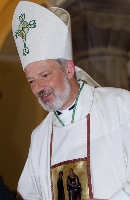Bishop says people now being recorded, tweeted and judged in matter of seconds.
The Bishop of Elphin has warned parishioners and the public about succumbing to the modern trend of instant judgement, particularly on social media.
Speaking while delivering a sermon in Knock, Bishop Kevin Doran said nowadays many take delight in “watching other people squirm” and that while people talk about the importance of being non-judgemental, the truth is anything but.
“The paradox is that we live in a world which is anything but merciful. This is due in part to the fact that we live our lives in a much more public way than any generation before us. They used to say that, in urban society, the nearest rat is never more than a few metres away. Today, however, it seems that the nearest smartphone is never more than a few metres away. People are recorded, tweeted and judged in a matter of seconds, presumably by people ‘who never put a foot wrong in their lives’. Let us be honest too, there is a market out there for watching other people squirm.”
The bishop, who was delivering the homily on the theme “The Mercy of God”, said it was important not to simply speak in a vacuum about mercy.
“We are about to have a referendum on the meaning of marriage. I know that this is quite painful for some people because the question of same-sex relationships touches them in the reality of their own families. Others, while believing in the marriage of a man and a woman, wonder if they are entitled to express this view publicly anymore, because it might offend others. So where is the balance between mercy and truth? Can we judge?
“The answer of course is that we must judge, but that our judgement must always be merciful.” There is a moral responsibility, said the Bishop, on every Christian to make a judgement about the forthcoming referendum, “a judgement which is based on the truth” and on all citizens who have a vote to exercise it.
He said the idea that marriage is between a man and a woman is not a uniquely Christian one.
“It is rooted in the nature of our humanity”, he said.
“Without apologising for the truth, we do need to be conscious – in the manner in which we express ourselves – of the hurt that people may be experiencing.
“Finally, as with every issue that divides people, there will be a need for mercy when all of this is over. No moral pronouncement, and likewise no referendum, should ever be about crushing people”, he said








